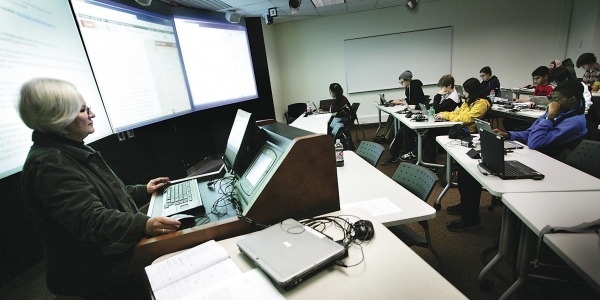November 6, 2011 - The Chronicle of Higher Education - By Marc Parry

Sarah Weeden for The Chronicle
Paulette Swartzfager reviews papers in her writing class at the Rochester Institute of Technology. Both she and her students use Turnitin software to screen their work.
In the latest development, the company that sells colleges access to Turnitin, a popular plagiarism-detection program that checks uploaded papers against various databases to pinpoint unoriginal content, now also caters directly to students with a newer tool called WriteCheck, which lets users scan papers for plagiarism before handing them in.
Meanwhile, faculty members at some colleges are adopting a reverse image-search program called TinEye, which lets them investigate plagiarism in visual materials like photos and architectural designs.
Cheating is nothing new. But as the frontiers of academic policing continue to advance—some 2,500 colleges now use Turnitin—faculty members are being pushed to confront classroom conundrums: Should they scan all papers for plagiarism, and risk poisoning the classroom atmosphere? Should they check only suspicious texts, and preserve harmony at the risk of missing clever cheaters? Could Turnitin and technologies like it lead to more plagiarism, since professors might depend on their imperfect results rather than vigorously investigate suspicious material on their own?
Gauging the extent of plagiarism is difficult. Roughly 62 percent of undergraduates and 40 percent of graduate students admit to having cheated on written work, according to the latest figures from a long-running national survey by Clemson University's International Center for Academic Integrity. The infractions range from cut-and-paste copying to buying a custom-written paper from an essay mill. Despite the perception that cheating has gotten out of hand with so much online content available to copy, the numbers have not changed much over the two decades that the survey has been conducted.
What has changed is how much easier it is to find plagiarism. Once, instructors who suspected cheating had to trek off to the library and hope they could track down the book a student had plagiarized from, recalls Susan D. Blum, a professor of anthropology at the University of Notre Dame. Now they can start the investigation with software that resembles a spell-checker. Some colleges even mandate that all written assignments be subjected to a digital pat-down. The growth of online education also favors such scanning, since papers must be submitted electronically anyway.
Read the full piece.
Meanwhile, faculty members at some colleges are adopting a reverse image-search program called TinEye, which lets them investigate plagiarism in visual materials like photos and architectural designs.
Cheating is nothing new. But as the frontiers of academic policing continue to advance—some 2,500 colleges now use Turnitin—faculty members are being pushed to confront classroom conundrums: Should they scan all papers for plagiarism, and risk poisoning the classroom atmosphere? Should they check only suspicious texts, and preserve harmony at the risk of missing clever cheaters? Could Turnitin and technologies like it lead to more plagiarism, since professors might depend on their imperfect results rather than vigorously investigate suspicious material on their own?
Gauging the extent of plagiarism is difficult. Roughly 62 percent of undergraduates and 40 percent of graduate students admit to having cheated on written work, according to the latest figures from a long-running national survey by Clemson University's International Center for Academic Integrity. The infractions range from cut-and-paste copying to buying a custom-written paper from an essay mill. Despite the perception that cheating has gotten out of hand with so much online content available to copy, the numbers have not changed much over the two decades that the survey has been conducted.
What has changed is how much easier it is to find plagiarism. Once, instructors who suspected cheating had to trek off to the library and hope they could track down the book a student had plagiarized from, recalls Susan D. Blum, a professor of anthropology at the University of Notre Dame. Now they can start the investigation with software that resembles a spell-checker. Some colleges even mandate that all written assignments be subjected to a digital pat-down. The growth of online education also favors such scanning, since papers must be submitted electronically anyway.
Read the full piece.


No comments:
Post a Comment